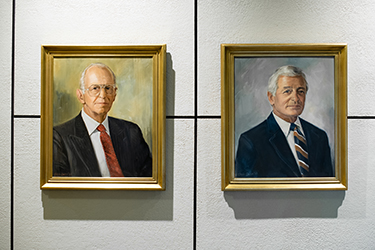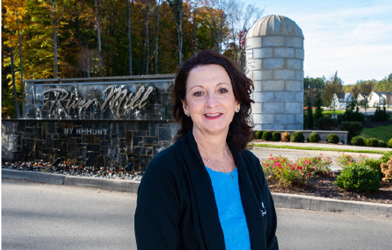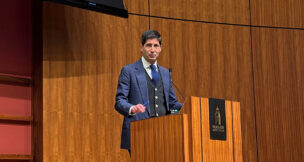Built on a solid foundation
After 75 years, commercial real estate remains Hirschler’s signature
Built on a solid foundation
After 75 years, commercial real estate remains Hirschler’s signature

As a lawyer at a title insurance company in 1980, Jim Theobald had assisted a variety of law firms handling commercial real estate transactions all over Virginia. However, after several years there, he was ready for a change. Eager to join a law firm, he liked what he saw at Hirschler, Fleischer, Weinberg, Cox & Allen.
“I worked with firms of all sizes, but with Hirschler I saw a meritocracy where younger lawyers were making partner and involved in leadership,” says Theobald, who joined the firm in December 1980. “The feeling among partners was and still is, ‘Why should I get in your way if you have an energy and are generating business?’ It just makes sense for the firm.”
After just six years at Hirschler, Theobald was named chairman of the real estate section at age 34. At 40, he was named president of the firm, a role in which he served from 1992 until 2004.
In a 2007 history of the law firm, Chuck Long, a longtime commercial real estate lawyer at the firm who passed away in 2017, called Hirschler’s strategy of promoting young leaders “the greatest single mindset that permitted the firm to grow and prosper.” He went on to say that permitting young leaders in the firm to “step forward and assert themselves [was] sometimes to the detriment of the older leadership but always to the betterment of the institution.”
It is that philosophy woven into a nimble business strategy that has given rise to a Richmond-based law firm that will celebrate its 75th anniversary in March 2021. Now operating as Hirschler, the firm is headquartered in the Edgeworth Building in Richmond’s Shockoe Bottom area and also has offices in Fredericksburg and Tysons.
The firm of 80 lawyers, one-third of whom are women, is led by its first female president, Courtney Moates Paulk, who was elected in 2018. “I have to say we owe our success to our culture,” says Paulk. “We all row in the same direction, and it’s very important that from top to bottom we focus on client service.”
While other practice areas — estate planning, health care, and mergers and acquisitions, to name a few — have been added over the years, commercial real estate development work has been the firm’s signature specialty since its founding. Richmonders would be hard-pressed to name a major area development that the firm didn’t have a hand in over the last 75 years. Riverfront Plaza, the Innsbrook business park, Regency Square mall, Colonial Downs, the Bon Secours Training Center and HHHunt Corp.’s Wyndham planned community in Glen Allen are just a few of the Central Virginia commercial and residential projects the firm has helped breathe life into over the years.
Hirschler’s client list has been varied, including Riverstone Group LLC, The Rebkee Co., Walmart Inc., Gumenick Properties, Markel | Eagle and Weinstein Properties. Many powerhouse residential and commercial developers and insurers have depended on the firm for help with land acquisition, zoning and construction issues.
“The firm started with the sole objective to just do good work and hopefully make a living,” says Theobald. “We have never been a hunting-prints-on-the-wall-and-Oriental-carpets-on-the-floor kind of firm.”
No ‘marshmallow’ workIn fact, its creation was pure happenstance. In 1945, war veterans Edward S. Hirschler, a Norfolk native, and Alan Fleischer, who hailed from New York and had married a Richmond woman, returned home from the Pacific Theater at the end of World War II. Both lawyers, they met by chance when they ended up working independently on the same floor in the former Central National Bank building. In a 1967 letter written by Hirschler about the firm’s origins, he explained, “We decided that two lawyers could starve to death as cheaply as one, and we started the firm of Hirschler Fleischer.”
In addition to shared backgrounds as veterans with offices on the same floor, the pair of lawyers were both Jewish, a liability at the time in a deeply segregated Richmond business community.
Hustling for work in their early years, Hirschler’s pre-war work with an older, real estate-focused lawyer, Alvin Hutzler, gave the young Hirschler inroads into local real estate and title work. E. Carlton Wilton, a local contractor generally credited with the creation of the city’s West End neighborhoods, found Hirschler when he sought a loan at Central National Bank from a friend of Hirschler, bank vice president Hilton Herman, who introduced the two. Wilton would be the first of the new firm’s big clients.
As Fleischer relates in the firm’s published history, “We never got what I call the ‘marshmallow business.’ I don’t ever recall walking into the Commonwealth Club and having someone say, ‘Gee, Alan, it just happened my aunt died and there’s a $4 million estate, can you help out?’ It didn’t come easy to us that way. But I noticed we got a lot of cases because we did good work.”
When finding clients proved challenging in the late 1940s, the law partners decided to form their own businesses to generate legal work. Beginning with an insurance company that would offer credit life policies for people who had incurred debt, Hirschler and Fleischer created Fidelity Bankers Life Insurance Co. with guidance from their friends (and future clients) in the auto and business casualty insurance business, the Markel family.
Next, with the help of a friend in the credit clothing business, Alvin Askin, they went into the mortgage business, accumulating a portfolio of second mortgages substantial enough to warrant the creation of a company called Security Industrial Loan Association, which eventually earned assets of about $20 million before the partners sold it to a New York company. Hirschler and Fleischer also helped found a bank, Metropolitan National Bank, which was later sold to Dominion National Bank.
The firm has grown its business as needs and opportunities have presented themselves. “Our goal has been to be a full-service firm, which we have met to the extent that we have the practice strength to position us to provide the exceptional service our clients deserve, and that’s a good thing,” says Theobald.
Carrying the rock
HHHunt has been a client of Hirschler since the 1980s. Hirschler helped HHHunt with zoning and launching its first Richmond-area planned community, Wellesley, in Henrico County. That led to work on a steady progression of other HHHunt communities in the metro area, including Wyndham, Twin Hickory, Wyndham Forest, Rutland, The Villages of Charter Colony, Providence and, most recently, River Mill and Wescott.

Hirschler “is diversified with expertise in many disciplines and this cross-section of talents is important to our success,” says Kim Kacani, senior vice president of business development at HHHunt. “Perhaps most important, Hirschler understands how critical relationships and reputation are in our industry and has worked to establish positive relationships in the localities where we operate. While they know the law, they respect that we know ‘the deal.’
“They listen and seek our counsel when it comes to each matter before them, wanting to understand our desired outcomes and what’s important to us. This type of collaborative process and partnership has been key to our success.”
On the threshold of a milestone anniversary for Hirschler, Paulk is eager to underscore the firm’s adaptive nature and client-focused business philosophy. A strategic plan unveiled in mid-October establishes a foundation for the future built on the four pillars that have carried the firm through nearly eight decades: a purpose-driven culture, exceptional talent, strategic resilience and competitive advantage.
The plan stresses that while the firm’s greatest asset is its talent, its success is “inextricably linked” to its client-centered culture and focus.
“Hirschler Fleischer has continuously adapted based on client need,” says Paulk. “And we will continue to focus on client need, filling in gaps where we find them.”
Like builders constructing a stone foundation, Hirschler’s attorneys “all need to be ready to ‘carry the rock’ for the firm,” Paulk adds. “It could be learning a new computer software program to help with contracts, or a skill that the firm can use to advance a practice area or improve a process. It’s possible that to hone a special skill or acquire experience in a needed field, it will require sacrifice, but it’s an important part of being a successful team.”
"
















